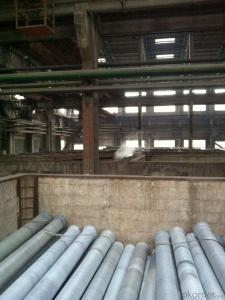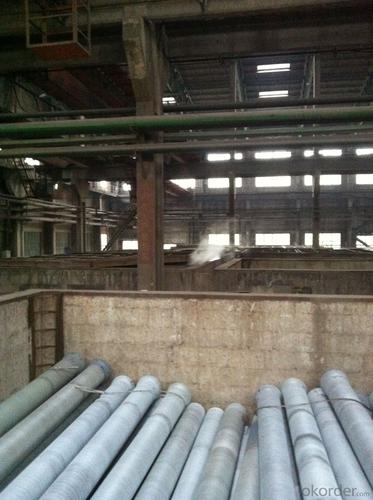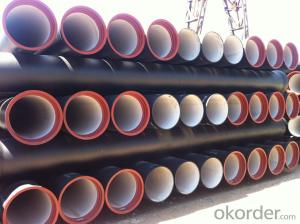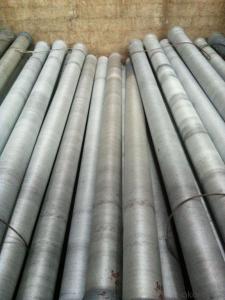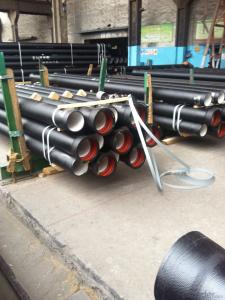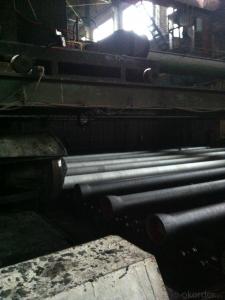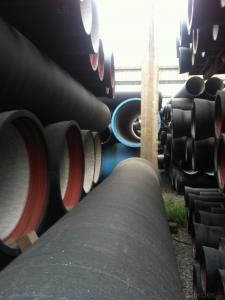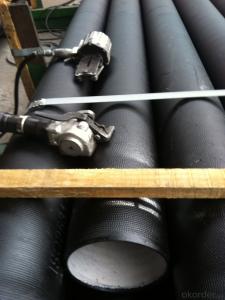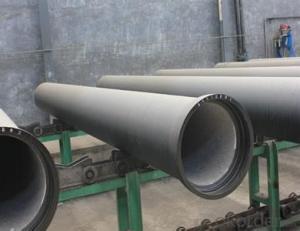DUCTILE IRON PIPE AND PIPE FITTINGS K7 CLASS DN800
- Loading Port:
- Tianjin
- Payment Terms:
- TT OR LC
- Min Order Qty:
- 23 pc
- Supply Capability:
- 3000 pc/month
OKorder Service Pledge
OKorder Financial Service
You Might Also Like
· Material : Ductile Cast Iron
· Size Range : DN 80mm to DN 2000mm
· Unit Effective Length : 6m or 5.7m
· Manufacture Standard: ISO 2531:1998/ EN 545:2006/EN 598:2007
· Annual capacity : 200,000 tons
· Coating Exterior: Zinc 130g/m2 according to ISO 8179-1 and bitumen coating 70 microns.
· Cement Interior: Portland Cement/ High Alumina Cement/ Sulphate Resisting Cement Lining according to ISO 4179
· Special requirements on external coating and internal lining can be applied
· We also provide accessories such as SBR/EPDM rubber gaskets, lubricant paste, pipe caps, PE sleeves, etc.
Additional Parts:
Each pipe is strictly inspected according to related standard to ensure permanently high performance.
Easy Installation at site and service free for life
Long Service Lifespan
Quotation will arrive you within 24hours once we get your inquiry.
We guarantee offering you a competitive price.
A copy of original inspection reports of pipes will be offered after shipment.
Photos of loading process will be sent to the customer after shipment effect.
We will follow-up the delivery progress after shipment effect and update to the customer on weekly basis.
- Q: Can ductile iron pipes be used for underground hydrocarbon pipelines?
- Yes, ductile iron pipes can be used for underground hydrocarbon pipelines. Ductile iron is a strong and durable material that is commonly used in various applications including water and sewage systems, gas pipelines, and even hydrocarbon pipelines. Ductile iron pipes have excellent corrosion resistance properties and can withstand high pressures, making them suitable for transporting hydrocarbons underground. However, it is important to consider factors such as the specific composition of the hydrocarbons being transported and the environmental conditions of the pipeline route to ensure proper material selection and corrosion protection measures are implemented.
- Q: Ductile iron pipe joint damage, water leakage, want to see the connection with other pipe fittings, how to operate?!
- The ductile iron pipe can be used as the plugging device for the big part
- Q: What are the typical installation methods for ductile iron pipe?
- The typical installation methods for ductile iron pipe include trenching, horizontal directional drilling, and jacking. In trenching, a trench is excavated and the pipe is laid and supported on a bed of aggregate. Horizontal directional drilling involves drilling a pilot hole underground and then pulling the pipe through the hole. Jacking is a method where the pipe is pushed into the ground using hydraulic jacks.
- Q: Can ductile iron pipes be used for irrigation systems?
- Yes, ductile iron pipes can be used for irrigation systems. Ductile iron pipes are commonly used in various applications, including water supply systems and irrigation systems. They are known for their strength, durability, and corrosion resistance, making them suitable for transporting water in irrigation systems.
- Q: How do ductile iron pipes handle thermal cycling in industrial applications?
- Ductile iron pipes are renowned for their exceptional ability to withstand thermal cycling in industrial applications. Thermal cycling refers to the fluctuation in temperature that occurs during the operation of various industrial processes. These pipes are designed to endure the stresses caused by thermal expansion and contraction, thus making them highly suitable for environments with significant temperature variations. One of the noteworthy features of ductile iron pipes is their remarkable thermal conductivity. This means that they efficiently dissipate heat from the hot areas, thereby minimizing the impact of thermal cycling. Furthermore, ductile iron pipes have a low coefficient of thermal expansion, which means that they expand and contract at a slower rate compared to other materials. This characteristic helps to reduce the stresses imposed on the pipes during thermal cycling. Moreover, ductile iron pipes exhibit excellent mechanical properties, including high tensile strength and impact resistance. These properties enable the pipes to withstand the mechanical stresses that may arise due to thermal cycling. They can resist the development of cracks or fractures, ensuring the integrity and durability of the pipes in industrial applications. Additionally, ductile iron pipes possess a high resistance to corrosion and oxidation. This is particularly crucial in industrial settings where the pipes may be exposed to aggressive chemicals or harsh environments. The corrosion resistance of ductile iron pipes ensures that they can endure the corrosive effects of process fluids and gases, even during thermal cycling. In conclusion, ductile iron pipes are well-equipped to handle thermal cycling in industrial applications. Their high thermal conductivity, low coefficient of thermal expansion, excellent mechanical properties, and resistance to corrosion make them a reliable choice for environments with significant temperature variations. These pipes effectively withstand the stresses caused by thermal cycling, guaranteeing their durability and longevity in industrial settings.
- Q: Do ductile iron pipes require internal linings for potable water?
- No, ductile iron pipes do not require internal linings for potable water.
- Q: What is the expected bedding and backfill requirements for ductile iron pipes?
- The expected bedding and backfill requirements for ductile iron pipes are vital for ensuring the longevity and proper functioning of the pipe system. Ductile iron pipes are known for their durability and strength, but they still require careful installation to prevent any potential damage or compromised performance. The bedding requirements for ductile iron pipes involve providing a stable and uniform support system to distribute the loads and stresses from the surrounding soil. The pipe should be surrounded by a bedding material that is free from rocks, debris, or any sharp objects that could potentially cause damage. The bedding material should also have sufficient compaction to prevent settlement or shifting that could lead to misalignment or pipe failure. Typically, the bedding material used for ductile iron pipes is a granular material, such as sand or fine aggregate, with a thickness of at least 6 inches. This material should be placed beneath and around the pipe in a uniform manner to provide a continuous support system. Additionally, the bedding material should be compacted to at least 90% of the maximum dry density to ensure proper stability and load distribution. Backfill requirements for ductile iron pipes involve the material used to fill the remaining space around the pipe after the bedding has been installed. The backfill material should also be free from rocks, debris, or sharp objects that could potentially damage the pipe. It should provide support and protection to the pipe while allowing for proper compaction and settling. The backfill material for ductile iron pipes is typically a granular material, such as sand or fine aggregate, with a maximum particle size of 1 inch. The backfill material should be placed and compacted in layers, ensuring that the compaction is done uniformly and evenly around the pipe. The compaction should be sufficient to prevent settlement or shifting of the backfill material, which could lead to pipe damage or misalignment. In summary, the expected bedding and backfill requirements for ductile iron pipes involve using a granular material that is free from rocks, debris, or sharp objects. The material should be placed and compacted in a uniform manner to provide stable support and protection to the pipe. Adhering to these requirements will help ensure the proper functioning and longevity of ductile iron pipe systems.
- Q: What is the expected bending stress capacity of ductile iron pipes?
- The expected bending stress capacity of ductile iron pipes can vary depending on various factors such as the pipe's diameter, wall thickness, and the specific grade of ductile iron used. However, generally speaking, ductile iron pipes have a high bending stress capacity compared to other pipe materials. Ductile iron pipes are known for their high tensile strength and flexibility, making them capable of withstanding significant bending stresses. The exact bending stress capacity can be determined through rigorous testing and analysis by considering factors like the pipe's mechanical properties, dimensions, and the maximum allowable deflection. It is important to note that the bending stress capacity of ductile iron pipes should be evaluated in accordance with industry standards and guidelines. These may include standards such as the American Water Works Association (AWWA) C150 or International Organization for Standardization (ISO) 2531, which provide specifications and testing methods for ductile iron pipes. Ultimately, the expected bending stress capacity of ductile iron pipes is determined by several factors and should be assessed based on the specific requirements of the application, considering industry standards and guidelines for accurate and reliable results.
- Q: The difference between ductile iron pipe and steel pipe used in pipe jacking
- The casting processes of nodular cast iron pipes are continuous casting, hot die casting and water-cooled centrifugal casting, in which water cooling is the most advanced process in the world,
- Q: What is a graphite cast iron pipe?
- Ordinary cast iron consists of gray cast iron and ductile iron, the difference is the carbon in cast iron (graphite) exist, graphite in gray cast iron is in the shape of flake, so the strength and toughness are poor; graphite in shape is spherical, with little on dissevered the matrix. So strong and toughness will be much better.
Send your message to us
DUCTILE IRON PIPE AND PIPE FITTINGS K7 CLASS DN800
- Loading Port:
- Tianjin
- Payment Terms:
- TT OR LC
- Min Order Qty:
- 23 pc
- Supply Capability:
- 3000 pc/month
OKorder Service Pledge
OKorder Financial Service
Similar products
Hot products
Hot Searches
Related keywords
